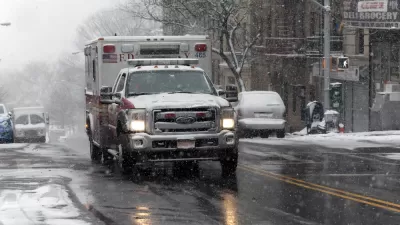The number of single households has grown three-fold since the 1950s. More sustainable and more likely to live in cities than married households, singles experience a major problem: metro areas are not planned for them but for nuclear families.
Eric Jaffe, with assistance from Devajyoti Deka of the Alan M. Voorhees Transport Centre at Rutgers University, writes about "people living alone", who he dubs "solos" (not to be confused with the transportation version: solo drivers or commuters) or singletons. According to Deka, "when it comes to housing and travel preferences, solos tend to live more sustainable lifestyles", with sustainability measured in terms of:
- Rented apartments over detached single-family-homes
- Commuting shorter distances
- Using public transit more often
One reason for the urban preference for solos is that they make more money and have more employment flexibility in cities.
But here's the paradox: "modern metro areas were largely planned and designed with the nuclear family in mind," says Jaffe. Today 28% of all households are solos. If cities want to attract solos, Deka has two recommendations:
- "Promote and enhance public transportation"
- Recognize that "contrary to much popular belief, there are twice as many elderly solos (above 65) than young ones (18 to 34)." [Perhaps that's why "solos" is used rather than the younger-sounding "singles"]. Housing choices are key: Single-occupancy-studio rentals can play a vital role
Dr. Deka's paper, "The Living, Moving and Travel Behaviour of the Growing American Solo: Implications for Cities", was published July 05 in Urban Studies. The abstract is available free, while the text requires a subscription to Urban Studies.
Readers may recall that the growing numbers of singletons was the topic of NYU sociology professor Eric Kleinberg's 2012 book, "Going Solo"; four articles on it can be accessed below under "Related".
FULL STORY: The Rise of People Living Alone Has Led to More Sustainable Cities

Alabama: Trump Terminates Settlements for Black Communities Harmed By Raw Sewage
Trump deemed the landmark civil rights agreement “illegal DEI and environmental justice policy.”

Study: Maui’s Plan to Convert Vacation Rentals to Long-Term Housing Could Cause Nearly $1 Billion Economic Loss
The plan would reduce visitor accommodation by 25% resulting in 1,900 jobs lost.

Planetizen Federal Action Tracker
A weekly monitor of how Trump’s orders and actions are impacting planners and planning in America.

Wind Energy on the Rise Despite Federal Policy Reversal
The Trump administration is revoking federal support for renewable energy, but demand for new projects continues unabated.

Passengers Flock to Caltrain After Electrification
The new electric trains are running faster and more reliably, leading to strong ridership growth on the Bay Area rail system.

Texas Churches Rally Behind ‘Yes in God’s Back Yard’ Legislation
Religious leaders want the state to reduce zoning regulations to streamline leasing church-owned land to housing developers.
Urban Design for Planners 1: Software Tools
This six-course series explores essential urban design concepts using open source software and equips planners with the tools they need to participate fully in the urban design process.
Planning for Universal Design
Learn the tools for implementing Universal Design in planning regulations.
Caltrans
Smith Gee Studio
Institute for Housing and Urban Development Studies (IHS)
City of Grandview
Harvard GSD Executive Education
Toledo-Lucas County Plan Commissions
Salt Lake City
NYU Wagner Graduate School of Public Service




























